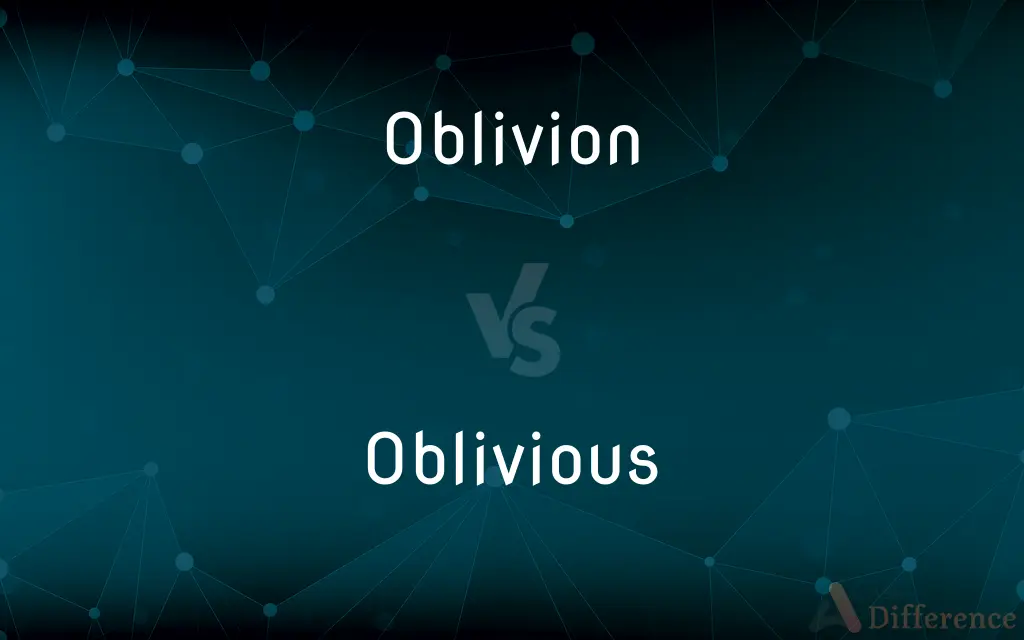Oblivion vs. Oblivious — What's the Difference?
By Maham Liaqat & Urooj Arif — Updated on April 1, 2024
Oblivion refers to the state of being forgotten or unknown, while oblivious denotes a lack of awareness or concern about what is happening around one.

Difference Between Oblivion and Oblivious
Table of Contents
ADVERTISEMENT
Key Differences
Oblivion is a state or condition of being forgotten or unknown, often used to describe the fading of memories or the neglect of individuals, places, or things. On the other hand, oblivious is an adjective describing a person's lack of awareness or attention to their surroundings, events, or the state of things. It implies a kind of unintentional ignorance or inattention.
While oblivion often carries a sense of finality or loss, as in historical sites falling into oblivion due to neglect, obliviousness is more about a temporary state of inattention or ignorance. For instance, one might be oblivious to the conversations happening around them if they are deeply engrossed in a book. Oblivion can be seen as a destination or outcome, whereas being oblivious is a condition that can change with new information or changes in one's focus.
The path to oblivion is irreversible in many contexts, such as cultural practices that disappear from collective memory. Conversely, obliviousness can be remedied by drawing attention to the overlooked information or details. Being oblivious is often not a permanent state, and individuals can move in and out of this state as their focus or knowledge changes.
Oblivion has been a theme in literature and philosophy, representing the ultimate fate of being forgotten or the erasure of existence or memory. Obliviousness, however, is more commonly referenced in everyday situations, reflecting temporary lapses in awareness or consideration.
In terms of emotional impact, oblivion might evoke a sense of sadness or nostalgia, contemplating the loss or erasure of history, memories, or identities. Being oblivious, on the other hand, might be viewed with a lighter tone, often associated with benign neglect or simple unawareness, which can be quickly corrected.
ADVERTISEMENT
Comparison Chart
Definition
The state of being forgotten or unknown.
Lacking awareness or concern about one’s surroundings.
Context of Usage
Often used to describe things or memories fading away.
Used to describe a person’s state of inattention or ignorance.
Reversibility
Typically irreversible, such as being forgotten by history.
Generally reversible by gaining awareness or information.
Emotional Connotation
Can evoke sadness or nostalgia.
Often seen as benign or due to distraction.
Application in Literature
Themes of loss, erasure, and the fading of existence.
Depicts characters or scenarios of inattention or ignorance.
Compare with Definitions
Oblivion
A metaphor for extinction or nonexistence.
The civilization fell into oblivion after the empire's fall.
Oblivious
Unaware of what is happening around one.
She was oblivious to the people staring at her.
Oblivion
The condition of being completely forgotten.
Ancient languages that have passed into oblivion.
Oblivious
Marked by a lack of conscious awareness or concern.
They were oblivious to the problems their decisions created.
Oblivion
Used to emphasize the complete erasure from memory or awareness.
The artist feared his work would sink into oblivion.
Oblivious
Reflects a lack of knowledge or awareness that can be corrected.
Oblivious to the facts, she made an uninformed decision.
Oblivion
Represents a final state of forgetting or being unknown.
The law faded into oblivion after years of disuse.
Oblivious
Showing a lack of attention to immediate surroundings.
Oblivious to the danger, he walked into the busy street.
Oblivion
Can denote a place of obscurity or non-recognition.
The once-famous actor lived in oblivion in his later years.
Oblivious
Denotes a temporary state of inattention.
He was so focused on his book that he was oblivious to the time.
Oblivion
The condition or quality of being completely forgotten
"He knows that everything he writes is consigned to posterity (oblivion's other, seemingly more benign, face)" (Joyce Carol Oates).
Oblivious
Not aware of or concerned about what is happening around one
She became absorbed, oblivious to the passage of time
Oblivion
The act or an instance of forgetting; total forgetfulness
Sought the great oblivion of sleep.
Oblivious
Lacking conscious awareness; unmindful
Oblivious to her surroundings.
Oblivious of the criticism against him.
Oblivion
(Archaic) Official overlooking of offenses; amnesty.
Oblivious
(Archaic) Lacking all memory; forgetful.
Oblivion
The state of forgetting completely, of being oblivious, unconscious, unaware, as when sleeping, drunk, or dead.
He regularly drank himself into oblivion.
Only the oblivion of sleep can heal the greatest traumas.
Oblivious
(usually followed by to or of) Lacking awareness; unmindful; unaware, unconscious of.
Oblivion
The state of being completely forgotten, of being reduced to a state of non-existence, extinction, or nothingness, including through war and destruction. (Figuratively) for an area like hell, a wasteland.
Due to modern technology, many more people and much more information will not slip into oblivion, contrary to what happened throughout history until now.
They tried to bomb them into oblivion.
I will cast them into oblivion!
Oblivious
Failing to remember; forgetful.
Oblivion
A form of purgatory.
Oblivious
Promoting oblivion; causing forgetfulness.
She lay in deep, oblivious slumber.
Oblivion
(obsolete) amnesty.
Oblivious
Evincing oblivion; forgetful.
Through are both weak in body and oblivious.
Oblivion
(transitive) To consign to oblivion; to efface utterly.
Oblivious
(followed by `to' or `of') lacking conscious awareness of;
Oblivious of the mounting pressures for political reform
Oblivious to the risks she ran
Not unmindful of the heavy responsibility
Oblivion
The act of forgetting, or the state of being forgotten; cessation of remembrance; forgetfulness.
Second childishness and mere oblivion.
Among our crimes oblivion may be set.
The origin of our city will be buried in eternal oblivion.
Oblivious
Failing to keep in mind;
Forgetful of her responsibilities
Oblivious old age
Oblivion
Official ignoring of offenses; amnesty, or general pardon; as, an act of oblivion.
Oblivion
The state of being disregarded or forgotten
Oblivion
Total forgetfulness;
He sought the great oblivion of sleep
Common Curiosities
Is being oblivious always negative?
Not necessarily; it can simply indicate temporary inattention or distraction.
What is oblivion?
A state of being forgotten or unknown, often irreversible.
Can a person be described as being in oblivion?
Typically, it refers to things or states being forgotten, not a temporary personal condition.
Is oblivion always associated with negative outcomes?
Often, but it can also represent peaceful forgetting or relief from burdensome memories.
What does it mean to be oblivious?
To lack awareness or concern about one's surroundings or circumstances.
Is there a way to prevent falling into oblivion?
Through preservation, documentation, and continued relevance or remembrance.
How are oblivion and oblivious different?
Oblivion is a state of being forgotten, while oblivious describes a lack of awareness.
Can something move from being oblivious to oblivion?
Conceptually, yes, as someone might first be unaware of something before it's completely forgotten.
Do oblivion and oblivious share the same root?
Yes, both come from Latin roots related to forgetting.
Can being oblivious affect relationships?
Yes, if it leads to neglecting the needs or concerns of others.
How can one move out of being oblivious?
By gaining awareness or information about what was previously overlooked.
Can technology fall into oblivion?
Yes, when it becomes obsolete and is forgotten over time.
How do writers and artists deal with the concept of oblivion?
Often as a theme to explore the impermanence of memory, legacy, and existence.
Can someone choose to be oblivious?
It's possible to consciously ignore certain facts or situations, though it's often unintentional.
What role does oblivion play in history?
It signifies the loss or erasure of cultures, languages, and historical facts over time.
Share Your Discovery

Previous Comparison
Sketch vs. Outline
Next Comparison
Recalcitrant vs. CalcitrantAuthor Spotlight
Written by
Maham LiaqatCo-written by
Urooj ArifUrooj is a skilled content writer at Ask Difference, known for her exceptional ability to simplify complex topics into engaging and informative content. With a passion for research and a flair for clear, concise writing, she consistently delivers articles that resonate with our diverse audience.














































